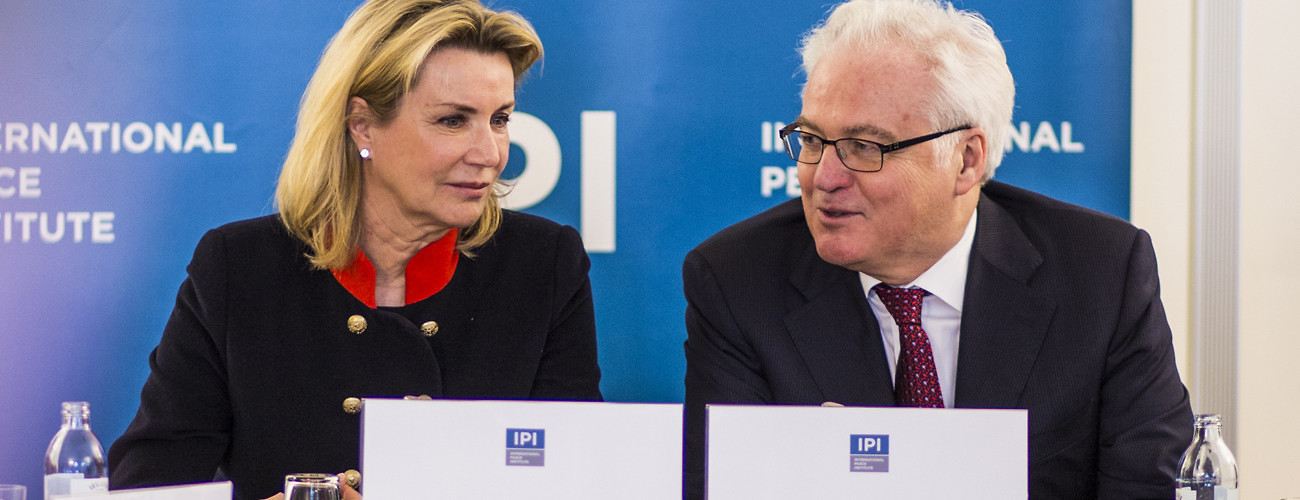On March 30th, IPI’s Vienna Office hosted a roundtable on “Russia and the maintenance of international peace and security” with Ambassador Vitaly Churkin, the permanent representative of the Russian Federation to the United Nations. The event was held under the Chatham House rule of non-attribution.
Participants included bilateral as well as multilateral ambassadors, high-ranking representatives of international organizations and institutions, as well as officials from the Austrian Federal Ministry for Europe, Integration, and Foreign Affairs (download full list of participants).
After an introduction by Andrea Pfanzelter, senior director of the IPI Vienna Office, Ambassador Churkin outlined a wide range of concurrent challenges to international peace and security. During the discussion, participants agreed on the need to promote and intensify multilateral cooperation to find adequate solutions. Despite the current tensions in international affairs—which hurt all parties and hinder effective cooperation—the dynamics in the UN Security Council are encouraging and producing good results, such as the recent Resolution 2199 (2015) on trade sanctions against terrorist groups. The important role of the diplomat, it was pointed out, is to show that confrontation can be avoided. Commemorating the bicentenary of the Congress of Vienna, the need to restore an effective multilateral world order has been advocated.
A speaker warned that such a commitment is being undermined when geopolitical interests take precedence, illustrating his argument, inter alia, with the implementation of UN Security Council Resolutions 1970 and 1973 (2011) as a regime-change agenda by Western powers. To compensate for the lack of trust resulting from political expediency, one must first establish a common understanding of international relations and commit to a consistency of policy.
Paraphrasing Henry Kissinger, it was stressed that a global order requires order at the regional level. In Ukraine, Syria, Yemen, and the Middle East conflict, there is urgent need for reconciliation by bringing all parties together instead of replacing one by another, a participant emphasized. In addition, approaches to UN Security Council reform should not overshadow other issues of the UN system that require attention.
A lively discussion centered on the conflict in and around Ukraine. Asserting that the Minsk agreement is the only viable pathway for Russia towards a political settlement, it has been suggested that the OSCE play a stronger role in dealing with the political process. Another point of discussion was the attitude of Western negotiating partners towards certain actions of the Ukrainian government that are perceived by some as hindering the process.
Other topics discussed touched upon a number of troubling developments in the Middle East. The stalemate between Israel and Palestine as well as the lack of a two-state solution could trigger a wave of destabilization throughout the region. Should the nuclear negotiations with Iran succeed, a formula on lifting sanctions brought forward to the UN Security Council will be complicated and challenging in its consequences. Addressing the civil war in Syria, participants critically assessed various forms of involvement and mentioned initiatives such as the “Moscow platform” in support of the political negotiations as well as US support for a “moderate opposition.” Recent regional efforts to prevent escalation in Yemen have been welcomed, even though certain aspects remain contestable. While these cases show that there are existing building blocks towards a comprehensive strategy for the wider Middle East region, a number of special situations like Syria, Iraq, or the Israel-Palestine conflict require a particular attention that considers an array of interrelated issues.
At an informal lunch buffet provided by IPI, the participants had a chance to continue the conversation with the experienced UN diplomat and engage in informal and open discussions that promoted better mutual understanding. The meeting was welcomed by attending diplomats as another manifestation of IPI’s long-standing convening capacity aimed at strengthening efforts towards international peace and security.
Related coverage:
Die Presse, April 5, 2015








